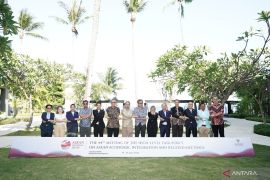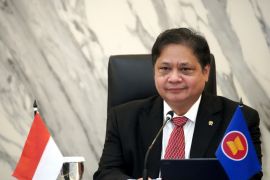The lack of public awareness on the implementation of the AEC is worrisome to an extent; however, with just a week left before the AEC comes into effect on January 1, it was a bit late to discuss it now.Jakarta (ANTARA News) - Didit Saputra (22), a street vendor in Pasar Baru, Central Jakarta, has never heard of the ASEAN Economic Community (AEC).
He does not even recollect reading about the AEC in newspapers, which are used to wrap the fruits he sells.
A father of two daughters, Didit has spent his days selling fruits for the last three years after losing his job in an agriculture equipment factory in West Java.
He had just finished arranging his merchandise when asked about the upcoming AEC scheduled to start in January 2016.
"None of my friends have ever mentioned it. What is the AEC by the way?" he questioned.
The AEC does not hold importance for Didit. He has no knowledge of the grand design to unify the regions economy but feels he has not missed out on anything significant.
Alike Dodi, Asep Saparna (25) also claimed to have not yet heard about the AEC, although he admits to spending his free time watching television.
"Does it have anything to do with Setya Novanto (former speaker of the Indonesian Parliament)?" he questioned with a spark of interest in his eyes.
Asep then raised a finger at some politicians who he believed were pocketing the publics money.
"I cannot stand corrupt politicians," he affirmed in a grim voice.
The fact that Didit and Aseps fruit stalls are located some 100 meters from a popular bookstore does not appear to change this situation.
Nining Fauziah (23), a shop assistant in one of the oldest footwear stores in Pasar Baru, located at a walking distance of some ten minutes from the vendors, voiced her ignorance about the AEC.
Fauziah only hoped that the government would lower the prices of basic necessities.
"I do not care (about the AEC). It is not important for ordinary people such as me," she noted.
Meanwhile, when informed that the AEC would increase competitiveness as it will become easier for goods from ASEAN countries to enter the country, Didit said he could deal with this development since most of his commodities came from abroad.
"I sell imported fruits that are mostly (they are imported) from China. As long as it makes the goods cheaper, I do not mind the implementation of AEC," he remarked.
Matoa, a traditional fruit from Papua, and rambutan, which he sold for Rp30 thousand per kilogram, are the only local fruits in his stall at the moment.
Another street vendor, Muhammad Farid (37), who sells fake designer bags, stated that most of his items were imported from China.
"Their price is cheaper than the local (fake designer) bags. Will the AEC also make the goods from China cheaper than their current price?" he questioned.
The implementation of the AEC can offer both opportunities and challenges to the country, especially in terms of the competitiveness and resilience of the nations economic sector, but it seems that none of them have realized it.
Dodi, Asep, Nining, and Farid are the people who will also be affected by the AEC, but none of them had adequate awareness about the AEC as the government had failed to include them in its priority list.
Over the past few years, the government and business community had held several meetings to discuss the pros and cons of the AEC. However, people such as Didit and his friends were never viewed as important to warrant an attention.
The lack of public awareness on the implementation of the AEC is worrisome to an extent; however, with just a week left before the AEC comes into effect on January 1, it was a bit late to discuss it now.
Despite the establishment of the AEC marked by a transformation of the ASEAN from a state policy-oriented regional block to a people-oriented community, which aims to improve the welfare of people in the region, it appears that the government has forgotten to increase the peoples awareness of the AEC.
A survey conducted by the Indonesian Institute of Sciences revealed that the level of public awareness regarding the AEC was only 25.9 percent.
Meanwhile, President Joko Widodo has affirmed on several occasions that Indonesia was ready to compete in the AEC, although business communities fear the country might lose out amid increased competition.
"Many have asked me if we are ready. Why should we be afraid?" the president noted in a press statement, adding that infrastructure development is the key to winning the competition.
Inadequate infrastructure to support inter-island connectivity has hindered Indonesias development programs that have been centered in Java, creating economic disparity and leading to decreased foreign investment.
In order to be competitive in the AEC, infrastructure development should be accelerated to strengthen domestic connectivity, which in the long run, would have a multiplier effect on the economy, such as additional investment, smoother distribution channels, and ultimately, increased economic growth.
Since last year, the government has aimed to improve infrastructure at ports to enable larger vessels, such as container ships to deliver directly to the country.
The president has planned to add some 20 ports during his term.
"To be or not to be, that is the question," said Prince Hamlet who once had all the time in the world to bemoan the importance of existence in his soliloquy.
However, Indonesia and the rest of the ASEAN member countries --- Brunei Darussalam, Cambodia, Malaysia, Myanmar, Laos, the Philippines, Thailand, Singapore, and Vietnam --- have no time to backtrack on their decision to create the one and only AEC by next year.
In accordance with the ASEAN charter, the region should embrace the AEC, although most of the leaders fear that their respective countries would be flooded with products and commodities from their neighbors.
They have also expressed concern over the lack of public awareness in their countries.
However, with the AEC only a week away from now, "to care or not to care, that is the question."
Talitha Jesslyn (15) said she chose to care. The high school student affirmed that she had opted for bilingual education in a bid to welcome the AEC.
"Yes, I know about the AEC. By the time I finish college, the AEC would have been implemented for six years, and I hope I will have the capability to compete with job seekers from ASEAN countries. It worries me sometime," she remarked while paying for her books at the bookstore.(*)
Reporter: Gusti Nur Cahya Aryani
Editor: Heru Purwanto
Copyright © ANTARA 2015











